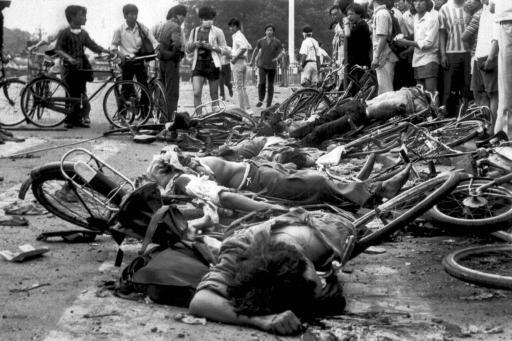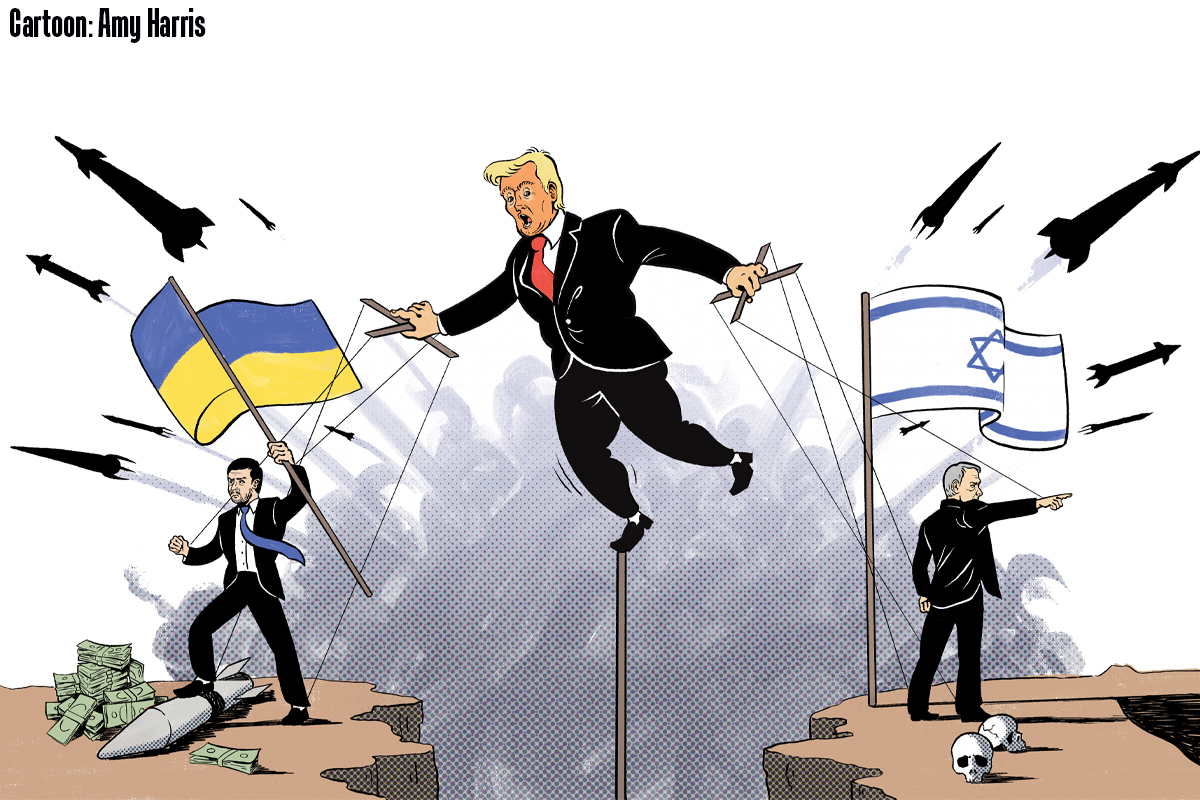When China’s former Premier Zhou Enlai,
was asked to comment on the historical significance of the French Revolution,
he famously replied "it is too early to
tell".Perhaps this is the fate of Tiananmen Square
1989.
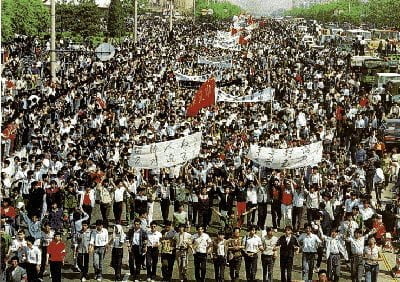 The Chinese students revolt signalled a
The Chinese students revolt signalled a
profound crisis in the reproduction of class relations and power within the
bureaucratic social system. The ruling bureaucracy and party elite were in
paralysis after only a few days of demonstrations, the masses sympathised with
the student demands for an end to corruption, for democratic control of the
Communist Party, and for a legal system with clearly defined written laws to
replace arbitrary bureaucratic power.
"Almost everything fell within its scope: campaigns against
corruption, nepotism, inflation, police brutality, bureaucracy, official
privilege, media censorship, human rights abuses, cramped student dormitories
and the smothering of democratic urges. But to say the demonstrations were to
"demand democracy" is an oversimplification."The truth is that the students in the square had only the
haziest understanding of western-style democracy. To the extent that the
protests were directed at abuses of an existing system by an emerging elite,
they were motivated more by outrage at the betrayal of socialist ideals than by
aspirations for a new system." James Kynge FT 4 June 2009
In late May 1989 the movement spread to the
urban masses. Each response by the party leadership to the demands of the
protests, revealed an organic incapacity of the bureaucracy to react
sensitively and speedily to the genuine concerns of the masses. The party
leadership sent the army to crush the movement by force, as power seemed to be
slipping out of their hands.
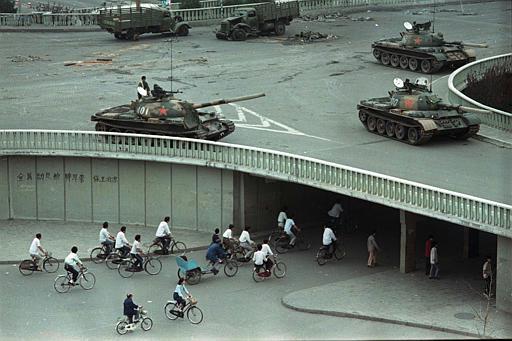 On June 4,1989 the Peoples
On June 4,1989 the Peoples
Liberation Army cleared Tiananmen Square and
quelled the protest movement with bullets and tanks. That same day Solidarity
won elections in Poland.
In November, the East German regime collapsed, this was followed by the
Czechoslovak regime a few days later and the Romanian regime by Christmas. At
the end of 1991 the Soviet Union disappeared.
How does one assess the significance of these movements that were heralded by
such euphoria and ended in violence, upheaval, chaos and collapse?
For most bourgeois commentators on these
events, the formula democracy equals good, is a sufficient criteria of
judgement regardless of the consequences for the mass of the people. In
democracy any choice is the peoples’ own choice, and any problems are
attributed to the birth pangs of the new ‘freedom’ or are blamed on the
‘remnants’ of the old system.
Marxists supported the anti-bureaucratic
movements in all these countries. We sought to strengthen the planning system,
to revitalize it and regenerate socialism. Political revolutions would free
society from rule by an ossified bureaucratic apparatus; and replace this with
mass democratic and revolutionary power of the working class. Our hope was that
these revolutions would come into correspondence with the communist ideal,
basing power on the direct control, ideas, aspirations, initiative and
inspiration of the masses. Marxists advocated democratic socialist planning and
an internationalist revolutionary policy.
Many Chinese communists and their Soviet
and East European counterparts argue that the movements of 1989-1991 were
"counter-revolutionary" by assessing matters on the basis of results. In China it seems the overwhelming majority not
only inside the party but also of the broad masses, believe that the repression
of the Beijing Spring saved China
and paved the way for rapid modernization and development. Leaning on this
economic progress, sections of the ruling elite have shifted away from the
official ideology of Marxism-Leninism-Mao Zedong thought, towards Confucianism
mixed with Adam Smith. This was displayed at the Beijing Olympics where ancient
history and a mythology of stability and continuity, replaced the 1949
revolution as the core image China
projected to the world.
Nevertheless the spectre of communism is
haunting China’s
rulers. Karl Marx identified the working class as the class that will bring
about communist revolution. This class is now objectively the most powerful
social force in China.
Numbering over 456 million it is easily the biggest working class in the world.
Communist ideals of egalitarianism, social justice and solidarity are core
beliefs of the Chinese workers because they correspond to their direct
interests. It is because of this social specific weight of the working class
that the Communist Party remains -in name-
a party committed to socialism and Marxism.
Looking back it is clear that in its sweep
and scope, the 1989 movement in China
and across the Eurasian continent, was one of the greatest social movements in
human history. Its outcome in China
was the reassertion of bureaucratic power and the continuation of rule over
the masses, in the name of the masses.
The ideas and slogans that ‘gripped the
minds of the masses’ were in the main both justified and socialistic. They
corresponded to the ideals of profound societal reform through
anti-bureaucratic political revolution. The Chinese bureaucracy still played a relatively progressive role in
developing the nation and thus they were able, not only to crush the movement,
but also to reassert their power for a generation.
In Eastern Europe and the USSR the
bureaucracy drove the economy into a blind alley, it was this objective
condition that provoked a much sharper and more sudden collapse in the authority
of the rulers and strengthened the forces of capitalist counter-revolution.
However even here matters were not written in stone. A clear and determined
revolutionary leadership could have shifted the direction of events in many of
these countries. This was revealed in the negative, by the incompetent
leadership of the August coup in the USSR in 1991.
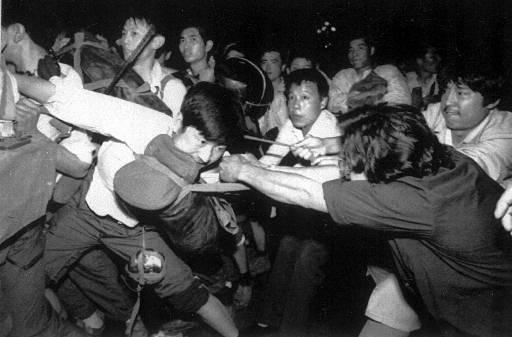 Communists seeking a resolution to this
Communists seeking a resolution to this
historical knot would do well to look at the international context and
formulate their reasoning around the fundamental objective requirement for
socialism: internationalism. One
successful anti-bureaucratic and democratic socialist movement, whether in China, the Soviet Union, or any country in Eastern Europe, could have ignited a spark that reversed
the apparently ‘inevitable path’
towards capitalism. A Eurasian socialist federation on
the basis of a unified market and an integrated democratic plan, could have
developed their combined economies faster than individual national economies
and thus laid the basis for world socialism.
Today Latin America’s
revolutionary movements prove that
democratic majorities for socialism are attainable, sustainable and exportable.
When a leadership is provided by one country, as Venezuela has done recently, the
contagion will spread. (Of course here, bourgeois commentators abandon their
formula, democracy equals good.)
It is a fact that in 1989 the majority from Beijing to Berlin
were in favour of creating a new socialist democracy to be supervised and
controlled by the masses, this was not a utopian dream. This idea remains, a
now hidden, now open force, capable of gripping the minds of the masses and
shaping the future of the planet.
Click here to read Rob Lyon’s article first published to mark the 15th anniversary in 2004.
Click here to read more about China

